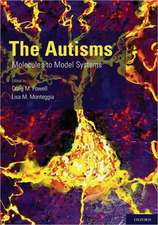Brain Protection in Schizophrenia, Mood and Cognitive Disorders
Editat de Michael S. Ritsneren Limba Engleză Paperback – 4 noi 2014
The book is divided into two sections. The first section serves as an introduction and overview of conceptual issues of the neuroprotective approach, and some neurobiological advances. Chapters in this section review definitions, perspectives, and issues that provide a conceptual base for the rest of the book. In addition, this part includes chapters in which the authors present and discuss the findings from basic studies of neurodegenerative mechanisms that are associated with the pathogenesis of major mental health disorders. The second section focuses on findings obtained from clinical trials with neuroprotective compounds, and neuromodulatory techniques. The take-home message is that principles of the neuroprotective approach may be applied to treatment of schizophrenia, mood and cognitive disorders. Contributors to this book are among the most active investigators and clinicians in the field who provide new perspectives not only clarifying ongoing controversies but also propose diverse aspects and new insights to neuroprotection.
This book is intended for a broad readership, which includes a broad spectrum of readers including neuroscientists, psychiatrists, neurologists, pharmacologists, clinical psychologists, general practitioners, geriatricians, graduate students, and policy makers in the fields of mental health.
| Toate formatele și edițiile | Preț | Express |
|---|---|---|
| Paperback (1) | 1234.77 lei 6-8 săpt. | |
| SPRINGER NETHERLANDS – 4 noi 2014 | 1234.77 lei 6-8 săpt. | |
| Hardback (1) | 1074.76 lei 38-44 zile | |
| SPRINGER NETHERLANDS – 21 mai 2010 | 1074.76 lei 38-44 zile |
Preț: 1234.77 lei
Preț vechi: 1505.82 lei
-18% Nou
Puncte Express: 1852
Preț estimativ în valută:
236.30€ • 241.99$ • 196.57£
236.30€ • 241.99$ • 196.57£
Carte tipărită la comandă
Livrare economică 19 martie-02 aprilie
Preluare comenzi: 021 569.72.76
Specificații
ISBN-13: 9789400799745
ISBN-10: 9400799748
Pagini: 680
Ilustrații: XV, 663 p.
Dimensiuni: 155 x 235 x 36 mm
Greutate: 0.93 kg
Ediția:2010
Editura: SPRINGER NETHERLANDS
Colecția Springer
Locul publicării:Dordrecht, Netherlands
ISBN-10: 9400799748
Pagini: 680
Ilustrații: XV, 663 p.
Dimensiuni: 155 x 235 x 36 mm
Greutate: 0.93 kg
Ediția:2010
Editura: SPRINGER NETHERLANDS
Colecția Springer
Locul publicării:Dordrecht, Netherlands
Public țintă
Professional/practitionerCuprins
Neuroprotective Strategies and Mechanisms.- Brain Protection in Neuropsychiatric Disorders: Past, Present and Future Challenges.- Towards a New Paradigm in Neuroprotection and Neuroplasticity.- What Protects Patients with Schizophrenia from Developing Alzheimer Pathology?.- Assessing In Vivo Neurodegeneration in Schizophrenia Using Magnetic Resonance.- Vulnerability of the Brain to Neuropsychiatric Disorders Resulting from Abnormal Thyroid Hormone or Vitamin D Homeostasis.- Phosphatidylinositol 3-Kinase/Glycogen Synthase Kinase and Mitogen-Activated Protein Kinase Signalling Cascades in Neuronal Cell Survival: What the Neurotrophins Have Taught Us and Implications For Neuropsychiatric Disorders.- One-Compound-Multi-Targets at Amyloid ? Cascade Offered By Bis(7)-Cognitin, a Novel Anti-Alzheimer’s Dimer.- Common Pathways to Neurodegeneration and Co-morbid Depression.- Breakdown of the Blood-Brain Barrier in Stress Alters Cognitive Dysfunction and Induces Brain Pathology: New Perspectives for Neuroprotective Strategies.- Oxidative Stress and Neurodegeneration: An Inevitable Consequence of Aging? Implications for Therapy.- Carbon Nanotubes as Electrical Interfaces with Neurons.- II. Neuroprotective Treatment and Neuromodulation.- Is a Neuroprotective Therapy Suitable for Schizophrenia Patients?.- Recombinant Human Erythropoietin: Novel Approach to Neuroprotection and Neuroregeneration in Schizophrenia.- Neuroprotective Agents in Mood Disorders: Pathophysiological and Therapeutic Implications.- Neuroprotection in Bipolar Depression.- New Antiepileptic Drugs in Neuropsychiatric Disorders – Basic Mechanisms Related to Clinical Efficacy.- The Neuroprotective Efficacy of Vitamins.- Smoking and Mental Disorders: Focus on Neuroprotection.- Inhibition of Glycine Transporter-1Improves the Functional Outcome of Schizophrenia.- The Role of Oxytocin in Neuropsychiatric Disorders: Concepts and Mechanisms.- Neuromodulation for Neuropsychiatric Disorders: Novel Techniques -Vagus Nerve Stimulation, Transcranial Magnetic Stimulation, Transcranial Direct Current Stimulation, and Deep Brain Stimulation.
Textul de pe ultima copertă
Neuroprotection is a novel perspective for the treatment of disorders that lead to neurodegeneration and disabilities as a result of deterioration of neurons due to apoptosis, oxidative stress, excitotoxicity, and other mechanisms. These mechanisms have implications not only for neurodegenerative disorders, but also for schizophrenia, mood and cognitive disorders. The purpose of this book is to provide an up-to-date overview of basic and clinical studies concerning the neuroprotective approach, mechanisms, and several compounds with neuroprotective properties that may contribute to more efficacious treatment of major mental health disorders. The book is divided into two sections. The first section serves as an introduction and overview of conceptual issues of the neuroprotective approach, and some neurobiological advances. Chapters in this section review definitions, perspectives, and issues that provide a conceptual base for the rest of the book. In addition, this part includes chapters in which the authors present and discuss the findings from basic studies of neurodegenerative mechanisms that are associated with the pathogenesis of major mental health disorders. The second section focuses on findings obtained from clinical trials with neuroprotective compounds, and neuromodulatory techniques. The take-home message is that principles of the neuroprotective approach may be applied to treatment of schizophrenia, mood and cognitive disorders. Contributors to this book are among the most active investigators and clinicians in the field who provide new perspectives not only clarifying ongoing controversies but also propose diverse aspects and new insights to neuroprotection. This book is intended for a broad readership, which includes a broad spectrum of readers including neuroscientists, psychiatrists, neurologists, pharmacologists, clinical psychologists, general practitioners, geriatricians, graduate students, and policy makers in the fields of mental health.
Caracteristici
Neuroprotective strategies Mechanisms of brain protection Neuromodulation for neuropsychiatric disorders Novel neuroprotective agents















